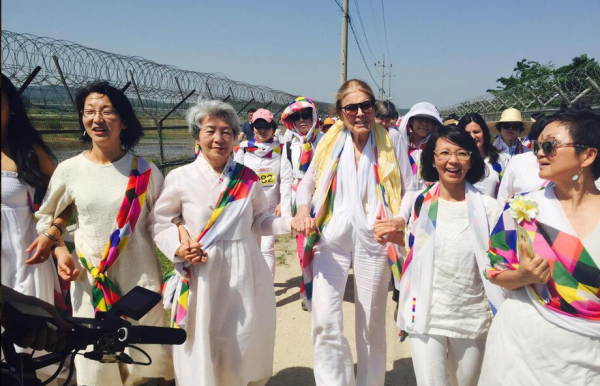by REERA YOO | @reeraboo
editor@charactermedia.com
International female peace activists crossed the heavily fortified border between North and South Korea on Sunday, calling for an end to the Korean War, according to the Associated Press.
The group of 30 women from 15 countries included pioneering American feminist Gloria Steinem and Nobel Peace laureates Mairead Maguire of Northern Ireland and Leymah Gbowee of Liberia. Although the activists were denied an attempt to walk across the Demilitarized Zone, North Korea allowed a bus to transport the women from the North side of the DMZ to the South.
“We have accomplished what no one said can be done, which is to be a trip for peace, for reconciliation, for human rights and a trip to which both governments agreed,” Steinem told reporters after the group arrived in South Korea. “We were able to be citizen diplomats.”
"This is the first step in the right direction." — 2011 Nobel Peace Prize Laureate @LeymahRGbowee #womencrossdmz2015 pic.twitter.com/2GG8scGd2U
— Coleen Baik (@colbay) May 19, 2015
Arriving at the rally flanked by hundreds of police. Not necessary! WomenXDMZ2015 #Seoul pic.twitter.com/CexEBGyaAj
— Jodie Evans (@MsJodieEvans) May 24, 2015
CODEPINKs @MsJodieEvans @AnnWright46 & I on bus to Beijing airport en route to Pyongyang for #WomenXDMZ pic.twitter.com/8g4PeeRiYT
— Medea Benjamin (@medeabenjamin) May 19, 2015
Christine Ahn, co-organizer of WomenCrossDMZ, said the group initially wanted to march through the symbolic truce village of Panmunjom, where the armistice was signed in 1953. Still, she called the crossing a success and a “historic event” despite government restrictions.
The activists were also able to speak at a series of women-related events and seminars in North Korea ahead of the rare crossing, according to the Washington Post,
In Pyongyang, the women marched, carrying banners and singing songs, until they reached the first checkpoint leading to the DMZ. They were allowed to march again after passing the final checkpoint on the southern side of the DMZ, where a large number of media outlets as well as several protesters greeted them.
North Korean & International sisters embraced in tears. We made each other promises of peace. #womencrossdmz2015 pic.twitter.com/h2fWpKy2VV
— Coleen Baik (@colbay) May 21, 2015
Gloria Steinem and @christineahn lead the @WomenCrossDMZ into unification park. pic.twitter.com/FImZ1FwZm1
— Tim Shorrock (@TimothyS) May 24, 2015
Press conference after crossing to South Korea @WomenCrossDMZ pic.twitter.com/rFe7V8ODRX
— Erika Guevara Rosas (@ErikaGuevaraR) May 24, 2015
Many conservative protestors, including North Korean defectors, chanted “Go back to North Korea!” and carried signs that accused the group of legitimizing Kim Jong-un’s regime, according to the New York Times.
Other activists have criticized the peace walk, saying that the female activists are overlooking the well-documented human rights abuses in North Korea.
“It is absolutely outrageous that they completely ignore the suffering of the North Korean people, especially North Korean women,” Suzanne Schlote, head of North Korea Freedom Coalition, told CNN. “If they truly cared, they would cross the China-North Korea border instead, which is actually more dangerous now than the DMZ.”
Joshua Stanton, who runs the blog One Free Korea, also criticized the group for sidestepping North Korea’s “war on women.”
In a recent blog post, he wrote, “Steinem has had to duck questions about the regime’s rape and murder of female prisoners, the endemic and unpunished rapes of North Korean women by its soldiers, and the infanticides and forced abortions this regime inflicts on North Korean refugee women and their babies.”
However, after the group landed in South Korea, Steinem told reporters that human rights issues were mentioned in a declaration released during a seminar with a North Korean women’s group.
Maguire, who is renowned for her contributions to the Northern Ireland peace movement, said the human rights situation in North Korea would likely improve once the two divided Koreas signed a full peace treaty.
“You can get to human rights when you can have a normal situation and not a country at war,” she said on Sunday. ”
___
Featured image via Tim Shorrock/Twitter





